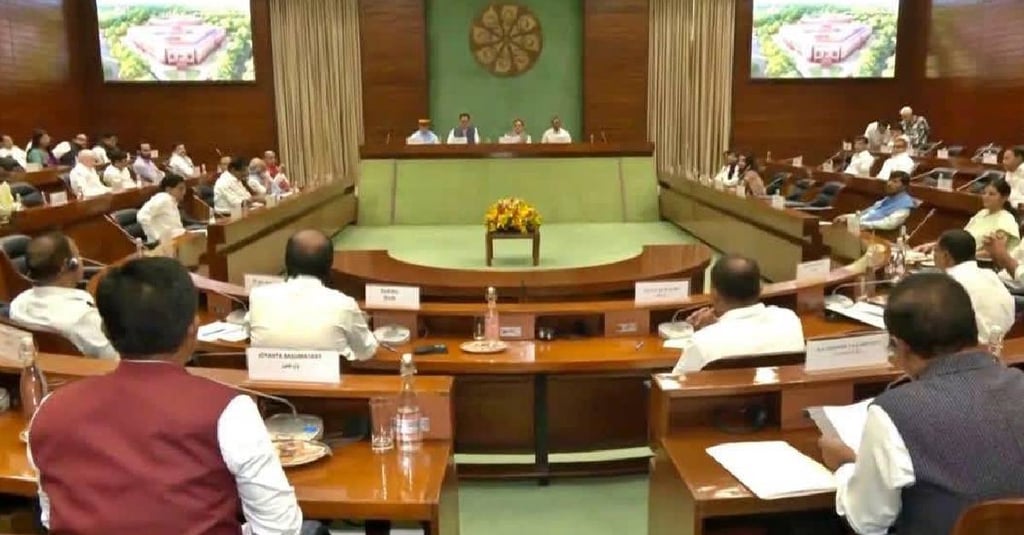MP Indra Hang Subba raises key issues in Parliament, calls for national focus on Sikkim’s concerns
The people of Sikkim have long demanded that their issues be given due importance in national forums, and Dr. Subba’s address was seen as a step in the right direction.
LOCAL


Lok Sabha MP Dr. Indra Hang Subba, representing the Sikkim Krantikari Morcha (SKM) participated in the meeting of Floor Leaders of Political Parties in Parliament. The meeting, held in New Delhi, was aimed at setting the tone for discussions in the upcoming Parliamentary session.
Speaking during the meeting, Dr. Subba took the opportunity to place before the House several critical issues that, he said, demand immediate attention from the central government and the nation at large. In a clear and sincere tone, he emphasised that these are not just regional matters but growing national concerns that could have long-term consequences if left unaddressed.
Among the foremost issues raised by Dr. Subba was the worrying trend of receding glaciers and the rapid expansion of glacial lakes in the Himalayan region. He pointed out that these environmental changes are not just affecting Sikkim but also pose a serious threat to water security in other parts of the country. “We are staring at a potential water crisis if this issue is not discussed and acted upon at the national level,” he warned.
Another point that the MP stressed was the rising menace of drug abuse and peddling, especially in border states and remote areas. Dr. Subba called for a comprehensive national policy to tackle this problem. “We need strong laws, more awareness, and active participation from society to protect our youth from this growing danger,” he added.
Dr. Subba also spoke about the urgent need to improve road and communication connectivity to border outposts. He highlighted that many forward areas in Sikkim still lack proper infrastructure, which not only affects the lives of the people living there but also has implications for national security. He urged the central government to invest more in strategic border infrastructure in Northeast India.
He also raised concerns about the adverse effects of online gaming, especially among young people. “It is affecting individuals mentally, financially, and socially. Families are struggling, and financial losses are becoming common. This issue must be studied seriously, and we need a clear policy to address it,” Dr. Subba said.
Further, he made a passionate appeal to the leadership of all parties to ensure that regional issues are not lost in the wider national discourse. “Let Parliament be the voice of the people and the protector of our future,” he said. He added that regional voices, especially from smaller states like Sikkim, must be heard and respected.
Dr. Indra Hang Subba’s intervention during the meeting has been appreciated by various quarters in Sikkim and beyond. His points reflected a grounded understanding of both local and national concerns and a strong desire to see meaningful policy discussions in Parliament.
The people of Sikkim have long demanded that their issues be given due importance in national forums, and Dr. Subba’s address was seen as a step in the right direction. Many observers noted that his focus on climate change, drug abuse, infrastructure, and youth-related issues is timely and relevant, especially at a time when the country is grappling with multiple social and environmental challenges.
It may be noted that Sikkim, despite being a small Himalayan state, plays an important role in India’s border security, ecological stability, and cultural diversity. Issues like glacier retreat and climate-related disasters, as seen in recent years, have brought the state into national headlines. The October 2023 Glacial Lake Outburst Flood (GLOF) that devastated parts of Sikkim is still fresh in the memory of the people, and many agree that Parliament must now take these matters more seriously.
The Sikkim Krantikari Morcha (SKM), the ruling party in the state, has consistently called for stronger representation of the state’s interests at the national level. Dr. Subba’s voice in Parliament, therefore, is being seen as a reflection of that political commitment.
